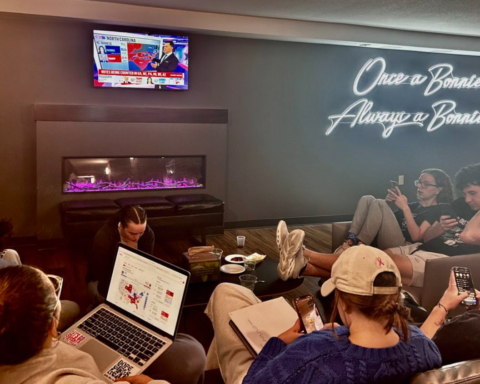By Amelia Kibbe
Managing Editor
Sophomore Erin O’Rourke exited the front door of Plassmann Hall on her way to the Hickey Dining Hall for lunch. As she descended the steps, she said she realized a student with a lit cigarette stood beside her.
Annoyed, O’Rourke, a marketing major, said she walked through a cloud of smoke and continued on her way. The student, she said, followed her to the dining hall before putting out his cigarette and entering the building.
Americans for Nonsmokers’ Rights did not list St. Bonaventure University on its 2015 listing of smoke-free campuses. As of Jan. 1, the group listed 1,514 smoke-free campuses in the United States, the group’s website said. The group defined a smoke-campus as a university that prohibits smoking or tobacco use anywhere on campus at all times.
St. Bonaventure’s policy prohibits smoking in any university facility and within 30 feet of entrances and exits to campus buildings. Students interviewed said St. Bonaventure should do more to enforce the policy. Some said they want a smoke-free campus, while others said it would infringe upon students’ rights.
“I feel like, especially at Plassmann, the people who smoke are practically in the door,” O’Rourke said. “When you follow someone on a crowded sidewalk, it’s impossible to get away from it.”
Richard Trietley, vice provost for student affairs, said campus security officers enforce the policy, although any community member can report a problem to him or another official. Trietley said university officials treat each case differently to consider factors such as number of offenses. Trietley did not provide details.
The university’s policy said officials will impose sanctions on violators after a judicial hearing, and students could be expelled and employees dismissed for repeated violations.
St. Bonaventure officials did not provide the number of policy violators or the number of sanctions.
Freshman Christopher O’Sullivan said he wants a stronger policy in place.
“I feel the rule is completely ignored by students and staff,” said O’Sullivan, a mathematics major.
For example, administrators at Jamestown Community College (JCC) in Olean instituted a campus-wide, tobacco-free policy this fall. The policy prohibits all tobacco forms and e-cigarettes on any college property, the university’s website said.
Kirk Young, vice president of enrollment, marketing and communications at JCC, said in order to implement the policy, the college ran an extensive marketing campaign to make students and staff aware. Young said although the school implemented no additional security, students and employees have respected the rule.
Trietley said to implement a new policy, St. Bonaventure officials could convene a task force to study the issue before cabinet members would approve a change.
However, some students said they think a change in St. Bonaventure’s policy would infringe upon student freedom.
“I would say I see students breaking the rules, but I also see employees breaking the rules too,” said Denis Riordan, a freshman history major and class president. “But, personally, I like to smoke a cigar occasionally, and I believe if we become totally smoke free, we are infringing on someone’s rights.”
Alexander Noguerola, president of student government, said he does not foresee a policy change.
“I think it would be helpful if the rule were enforced more,” said Noguerola, a senior political science major. “But I am not sure I see a policy change in the future. St. Bonaventure promotes student health but also respects student freedom.”
Benjamine Barnhart, a junior history major, said he smokes near buildings when it is cold or rainy outside.
“If people casually mention to me to move away, I’ll do it,” said Barnhart, who stood smoking and leaning against the front side of Plassmann Hall. “But I don’t think the policies are enforced. The university put the ashtrays right in the doorway.”
kibbeaa13@bonaventure.edu






